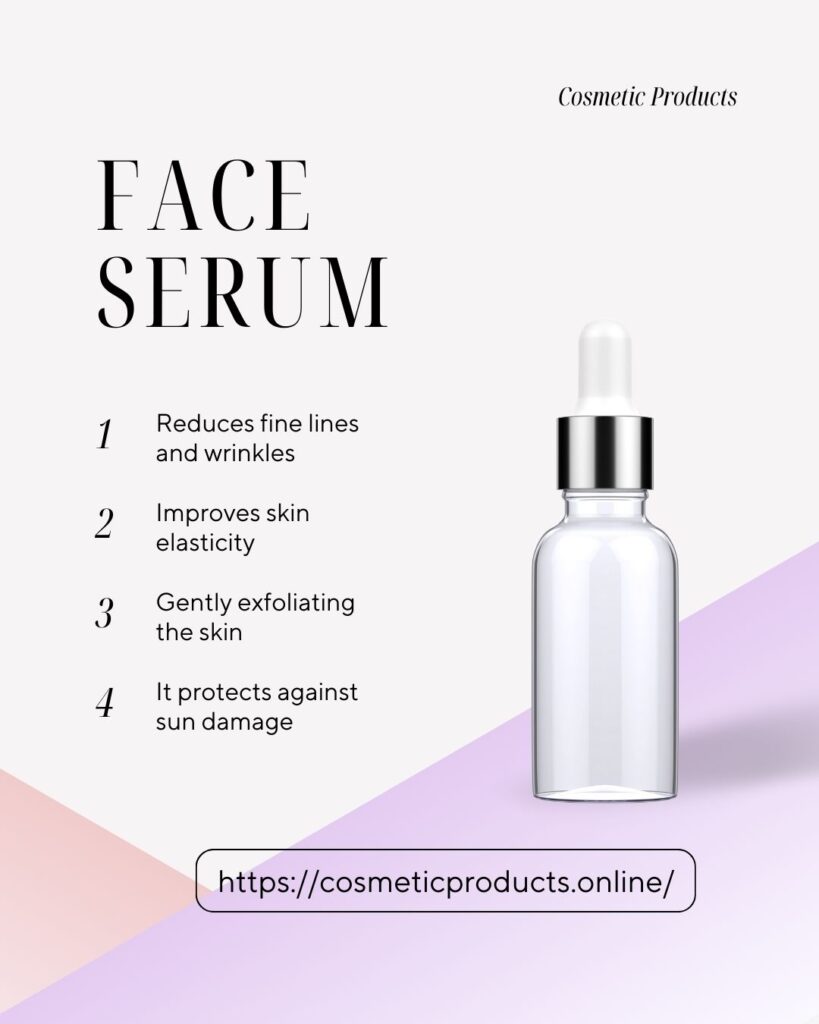The Ultimate Guide to Face Serums: Benefits, Uses, and How to Choose the Right One
When it comes to skincare, face serums have become a staple in beauty routines worldwide. Their lightweight yet potent formulas make them a favorite among those looking to target specific skin concerns. But what exactly is a face serum, and how can you make it a part of your daily regimen? In this comprehensive guide, we’ll explore everything you need to know about face serums, from their benefits to tips on choosing the perfect one for your skin type.
What Is a Face Serum?
A face serum is a lightweight, fast-absorbing skincare product formulated with a high concentration of active ingredients. Unlike traditional moisturizers, which primarily focus on hydration and forming a protective barrier, serums are designed to penetrate deep into the skin, addressing specific concerns such as wrinkles, dark spots, acne, or dehydration.

Serums are typically water- or oil-based and come in various textures, ranging from gel-like to lightweight oils. They are applied after cleansing and toning but before moisturizing, making them an essential middle step in a skincare routine.
Benefits of Using a Face Serum
Face serums offer a host of benefits, thanks to their concentrated active ingredients. Here are some of the key advantages:

1. Targeted Skin Concerns
Serums are formulated to address specific skin issues, such as fine lines, pigmentation, acne, or dullness. Their potent formulas work more effectively than general skincare products in tackling these concerns.
2. Lightweight Texture
Unlike heavy creams, serums are lightweight and non-greasy, making them suitable for all skin types, including oily and acne-prone skin.
3. Fast Absorption
Thanks to their smaller molecular structure, serums absorb quickly into the skin, allowing the active ingredients to penetrate deeper layers for maximum efficacy.
4. Boosts Hydration
Hyaluronic acid-based serums are a game-changer for dehydrated skin. They attract moisture to the skin, keeping it plump and hydrated throughout the day.
5. Brightens the Skin
Vitamin C serums are well-known for their ability to brighten the complexion, reduce dullness, and fade dark spots.
6. Anti-Aging Benefits
Serums containing retinol or peptides help boost collagen production, reduce fine lines, and improve skin elasticity.
How to Use a Face Serum
Using a face serum correctly ensures you get the most out of its benefits. Follow these steps for optimal application:
- Cleanse Your Skin
Start with a clean face to remove dirt, oil, and makeup. This ensures that the serum can penetrate the skin effectively. - Apply Toner (Optional)
A toner can help prepare your skin and enhance serum absorption. - Dispense the Right Amount
Typically, 2-3 drops of serum are enough for your entire face. Using more won’t necessarily enhance its effectiveness. - Apply Gently
Using your fingertips, gently pat the serum onto your skin. Avoid rubbing, as it may irritate sensitive areas. - Follow with Moisturizer
Seal the serum with a moisturizer to keep your skin hydrated and protected. - Use Sunscreen (Morning Routine)
If you’re applying serum in the morning, finish your routine with a broad-spectrum sunscreen to protect your skin from UV damage.
How to Choose the Right Face Serum for Your Skin Type
Selecting the perfect serum depends on your skin type and concerns. Here’s a breakdown of what to look for:
1. Dry Skin
- Look for serums with hydrating ingredients like hyaluronic acid, glycerin, and ceramides.
- Vitamin E is also a great choice for nourishment.
2. Oily and Acne-Prone Skin
- Opt for lightweight, non-comedogenic serums with ingredients like salicylic acid, niacinamide, or tea tree oil.
- Retinol can also help control acne and reduce excess oil production.
3. Sensitive Skin
- Choose serums with soothing ingredients like aloe vera, chamomile, or calendula.
- Avoid products with high concentrations of retinol or vitamin C, which can be irritating.
4. Mature Skin
- Look for anti-aging ingredients like retinol, peptides, and antioxidants.
- Hyaluronic acid can help reduce the appearance of fine lines by plumping the skin.
5. Dull or Pigmented Skin
- Vitamin C serums are ideal for brightening and reducing dark spots.
- For more effective pigmentation reduction, look for additional ingredients like arbutin or kojic acid.
Popular Ingredients in Face Serums and Their Benefits
Understanding the ingredients in a serum is crucial to finding the right one for your needs. Here are some of the most popular active ingredients:
- Vitamin C: Brightens skin, reduces dark spots and provides antioxidant protection.
- Retinol: Boosts collagen production, reduces fine lines, and smoothens texture.
- Niacinamide: Reduces redness, minimizes pores, and controls oil production.
- Hyaluronic Acid: Hydrates and plumps the skin by attracting moisture.
- Peptides: Promote collagen production and improve skin elasticity.
- Salicylic Acid: Unclogs pores and combats acne.
- Antioxidants (e.g., Green Tea, Vitamin E): Protect against environmental damage and soothe inflammation.
Common Mistakes to Avoid When Using a Face Serum
To ensure you’re reaping the full benefits of your serum, steer clear of these common mistakes:
- Using Too Much Product
Overusing a serum can lead to irritation or clogged pores. Stick to the recommended amount. - Skipping Moisturizer
While serums are hydrating, they don’t replace a moisturizer. Always follow up with one. - Not Using Sunscreen
Some serums, especially those with retinol or vitamin C, can make your skin more sensitive to the sun. Sunscreen is a must. - Mixing Incompatible Ingredients
Avoid layering serums with conflicting ingredients (e.g., vitamin C with retinol) unless specifically formulated for compatibility. - Inconsistent Use
Consistency is key to seeing results. Make serums a regular part of your routine.
DIY Face Serum Recipes for a Natural Glow
If you prefer natural skincare, you can try making your face serum at home. Here’s a simple recipe for a hydrating serum:
Ingredients:
- 1 tablespoon aloe vera gel
- 2-3 drops of vitamin E oil
- 2 drops of essential oil (e.g., lavender or tea tree)
Instructions:
- Mix the ingredients in a small, sterilized bottle.
- Shake well and apply 2-3 drops to your face after cleansing.
- Store in a cool, dark place and use within 2 weeks.
Top Tips for Maximizing Your Serum’s Benefits
- Patch Test New Products: Always patch test on a small area to ensure compatibility with your skin.
- Layer Wisely: Apply thinner, water-based serums first, followed by thicker, oil-based ones.
- Store Properly: Keep serums in a cool, dark place to maintain their efficacy.
- Be Patient: Results take time. Use your serum consistently for at least 4-6 weeks to see noticeable improvements.
Conclusion
Face serums are a powerful addition to any skincare routine, offering targeted solutions for various skin concerns. Whether you’re looking to brighten your complexion, fight signs of aging, or hydrate your skin, there’s a serum out there for you. By understanding your skin type and choosing the right ingredients, you can unlock the full potential of these skincare marvels.
Remember, consistency is key. Incorporate a serum into your daily routine and watch as your skin transforms over time. Happy glowing!



